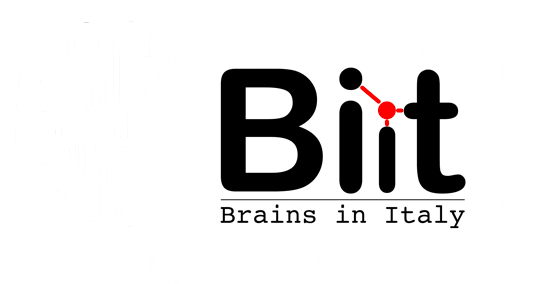
DEADLY TRIGGER
Lacking protein triggers aggressive form of breast cancer
INNESCO MORTALE
L' assenza di una proteina innesca le forme piu' aggressive di cancro mammario
Ufficio Stampa, Università di Milano

” The place where Italian science talks to the world “
Do you want to make your scientific research known? This is your chance. BIIT – Brains in Italy – is the first “Public Blog” that gives voice to the Italian scientific excellence, so much appreciated in the world, a direct link from labs to web. If you are a scientist – of any nationality – who works for an Italian scientific institution, both on the national territory and anywhere in the world, you can let everyone know about your original research by publishing a simple short informative report for free on this blog. We will do the rest, trying to get your voice as far away as possible.
What are you waiting for? The world is listening
Browse the news
Welcome to BiiT, which stands for BrainsInItaly. Biit is a free and innovative tool, the first and only of its kind: an “open” newspaper dedicated to Italian scientific excellence where the “journalists” are directly the scientists and the research institutes talk about their work.
On BiiT you can talk about everything you do in the laboratory and in the academy, as long as it has been published in an accredited magazine, even those niche works that never end up on the front pages of newspapers and that could instead inspire the next great technological innovation.
Are you a scientist and like science communication? or are you simply convinced that your research makes “the difference”? Have you ever wondered why your important study published perhaps in Nature or Science never ended up on TV while similar research done in an American university has gone around the world media? Simple, because in some countries the communication of science is further ahead, there are initiatives, newspapers and agencies that deal precisely with letting people know what is done inside the laboratories and dissemination is part of the “scientist” culture. Of course, similar initiatives also exist in Italy but are not accessible to everyone. BrainsInItaly directly opens dissemination to all Italian science wherever it is, no need to have big press offices.
BiiT is the first original tool founded with the idea of exponentially accelerating the exchange of knowledge between labs and people, and to do this we need you, scientists and aspiring disseminators.
In whatever discipline you work in you are in the right place.
If you have contributed to an original scientific work and published it in an international peer-reviewed journal, today you can make your work known to the world by becoming “science journalist for a day”, making a short news report that tells, in simple and understandable words, what you’ve found out, why it is important to let people know, and publish it immediately on our blog.
There are no discipline limits from medicine to statistics, from engineering to space to mathematics and archaeology, all you must do is register, write and post. Our team of professional communicators will quickly check if the work complies with BiiT’s indications and could perhaps help you by making the article more attractive and readable for the public, after which you will be online, and we will try to take you far.
BrainsinItaly will take care of promoting the news, making sure that your work is read and known about not only in Italy but also abroad. That’s why it’s important that you write in English too. In a world that has never been so small, to cross borders we must use the language most used in the scientific world.
If you have overcome the obstacle of writing for a scientific journal, publishing on BiiT will be a breeze, start immediately by clicking here. But do not forget: “popular science writing” is the job of making difficult things understandable to those who do not necessarily have the same adequate background, so I invite you to strip off any useless academicism and speak from “the belly”, describing your research in a few words, in a coarse but correct way and with captivating language. Do not be afraid to make mistakes, you have already passed the review of your peers when you first published, just deal with telling your news with passion and enthusiasm, imagining you are writing a few lines for a famous newspaper. Get noticed, be correct and bold in the titles, try to experiment, with your help we can take Italian science very far. Are you wondering if you can publish on Biit? Or how to do it? Don’t wait any longer, start right here:
– FAQ
– ISTRUCTIONS
News or press releases of any original scientific work previously published in a peer-reviewed scientific journal that certifies its validity according to the scientific method and review by experts in the field can be published on BiiT. Anyone with a right to its disclosure can publish, that is, a scientist who contributed to the study, rather than the institution that proposed and funded it or the press office that wants to disclose it. It is necessary to register on the site in a few clicks and write your “news”, accompanied by a title, a subtitle, insert a contact reference for further information and the link to the original abstract (doi) or to the full publication if free from commercial rights. Incomplete work, proposals, congress abstracts, preprints, institutional news or conference announcements cannot be published. To ensure compliance with the rules, the articles will be reviewed by our team of experts before publication, who will give approval on the suitability of the work and may make some editorial changes in order to increase the effectiveness of the news, or request reformulation in case the news was written in an unsuitable way for disclosure. Once approved the news will be online and will remain visible in our archives, navigable by category and tag, it can also be included in newsletters and editorial events.
It is not necessary to be the first author of the work, but only to have the right to divulge it, the original link will in fact contain all the full credits of the authors. Talking about your science is useful, creates culture and brings people closer to the world of science, often perceived as “very far away” but which invades our lives more and more and quickly shapes the world around us.
Do you still have any doubts? Read the FAQ.